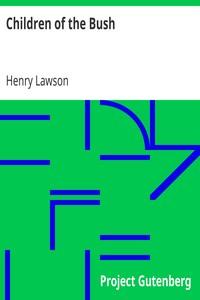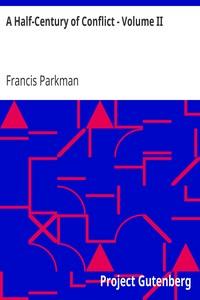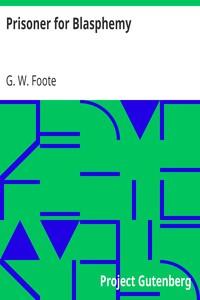Read this ebook for free! No credit card needed, absolutely nothing to pay.
Words: 73576 in 14 pages
This is an ebook sharing website. You can read the uploaded ebooks for free here. No credit cards needed, nothing to pay. If you want to own a digital copy of the ebook, or want to read offline with your favorite ebook-reader, then you can choose to buy and download the ebook.
PRISONER FOR BLASPHEMY
Originally published 1886
Persecution is not refutation, nor even triumph: the "wretched infidel" as he is called, is probably happier in his prison than the proudest of his assailants--BYRON.
London: Progressive Publishing Company 28 Stonecutter Street, E.C. 1886
CHAPTERS
PREFACE
This little volume tells a strange and painful story; strange, because the experiences of a prisoner for blasphemy are only known to three living Englishmen; and painful, because their unmerited sufferings are a sad reflection on the boasted freedom of our age.
My own share in this misfortune is all I could pretend to describe with fidelity. Without any meretricious display of fine writing, I have related the facts of my case, giving a precise account of my prosecutions, and as vivid a narrative as memory allows of my imprisonment in Holloway Gaol. I have striven throughout to be truthful and accurate, nothing extenuating, nor setting down aught in malice; and I have tried to hit the happy mean between negligence and prolixity. Whether or not I have succeeded in the second respect the reader must be the judge; and if he cannot be so in the former respect, he will at least be able to decide whether the writer means to be candid and bears the appearance of honesty.
One reason why I have striven to be exact is that my record may be of service to the future historian of our time. It is always rash to appeal to the future, as a posturing English novelist did in one of his Prefaces; and it is well to remember the witticism of Voltaire, who, on hearing an ambitious poeticule read his Ode to Posterity, doubted whether it would reach its address. But it is the facts, and not my personality, that are important in this case. My trial will be a conspicuous event in the history of the struggle for religious freedom, and in consequence of Lord Coleridge's and Sir James Stephen's utterances, it may be of considerable moment in the history of the Criminal Law. It is more than possible that I shall be the last prisoner for blasphemy in England. That alone is a circumstance of distinction, which gives my story a special character, quite apart from my individuality. As a muddle-headed acquaintance said, intending to be complimentary, Some men are born to greatness, others achieve it, and I had it thrust upon me.
Prosecutions for Blasphemy have not been frequent. Sir James Stephen was able to record nearly all of them in his "History of the Criminal Law." The last before mine occurred in 1857, when Thomas Pooley, a poor Cornish well-sinker, was sentenced by the late Mr. Justice Coleridge to twenty months' imprisonment for chalking some "blasphemous" words on a gate-post. Fortunately this monstrous punishment excited public indignation. Mill, Buckle, and other eminent men, interested themselves in the case, and Pooley was released after undergoing a quarter of his sentence. From that time until my prosecution, that is for nearly a whole generation, the odious law was allowed to slumber, although tons of "blasphemy" were published every year. This long desuetude induced Sir James Stephen, in his "Digest of the Criminal Law" to regard it as "practically obsolete." But the event has proved that no law is obsolete until it is repealed. It has also proved Lord Coleridge's observation that there is, in the case of some laws, a "discriminating laxity," as well as Professor Hunter's remark that the Blasphemy Laws survive as a dangerous weapon in the hands of any fool or fanatic who likes to set them in motion.
Judge North, on my first trial, plainly told the jury that any denial of the existence of Deity or of Providence was blasphemy; although on my second trial, in order to procure a conviction, he narrowed his definition to "any contumelious or profane scoffing at the Holy Scriptures or the Christian religion." It is evident, therefore, what his lordship believes the law to be. With a certain order of minds it is best to deal sharply; their first statements are more likely to be true than their second. For the rest, Judge North is unworthy of consideration. It is remarkable that, although he charged the jury twice in my case, Sir James Stephen does not regard his views as worth a mention.
Lord Coleridge says the law of blasphemy "is undoubtedly a disagreeable law," and in my opinion he lets humanity get the better of his legal judgment. He lays it down that "if the decencies of controversy are observed, even the fundamentals of religion may be attacked without a person being guilty of blasphemous libel."
Free books android app tbrJar TBR JAR Read Free books online gutenberg
More posts by @FreeBooks


: A Half-Century of Conflict - Volume II by Parkman Francis - United States History Colonial period ca. 1600-1775; Canada History To 1763 (New France); United States History Queen Anne's War 1702-1713 United States









